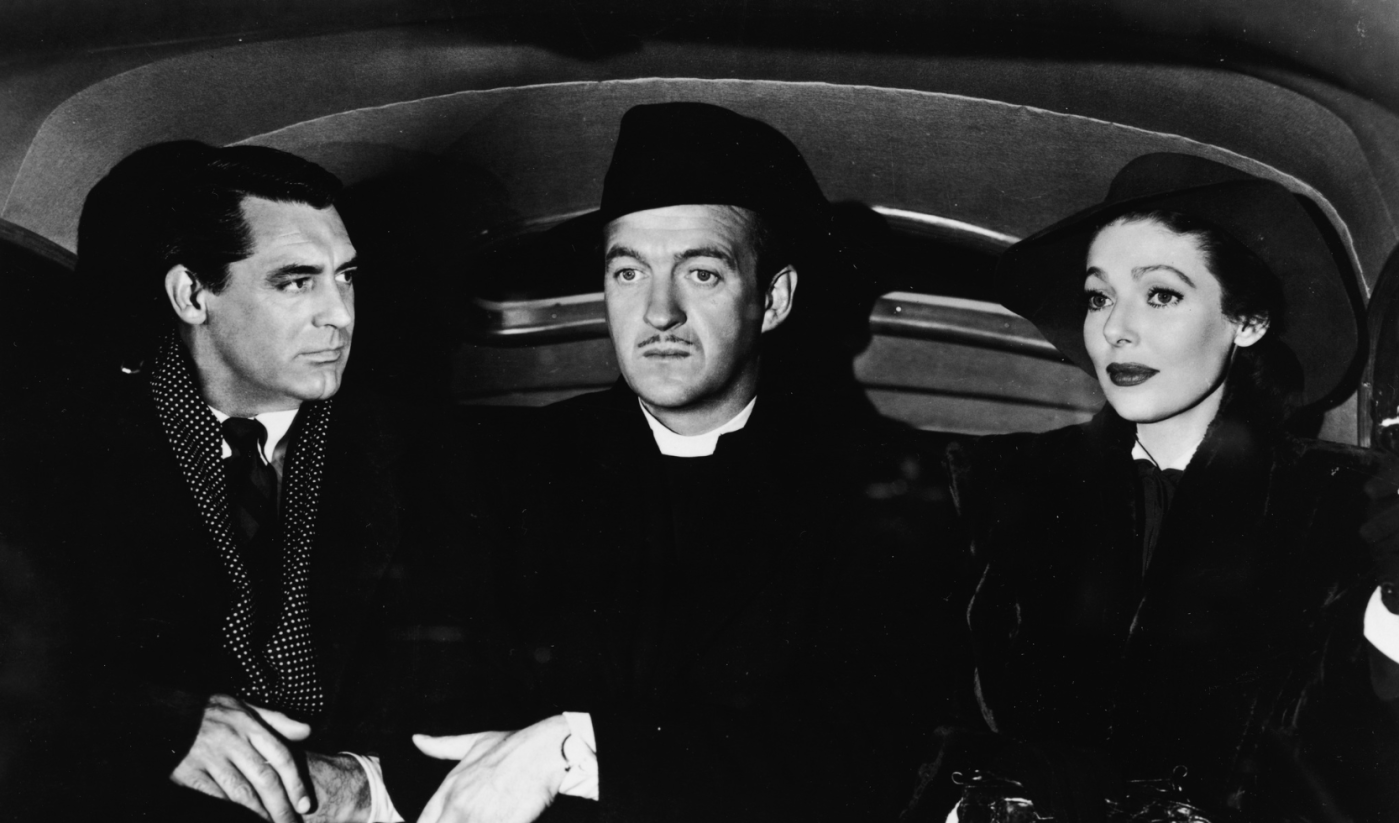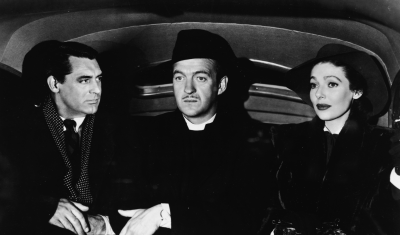Journalists love using anniversaries to write about their favorite things—bonus points if that anniversary is divisible by 25. All of this is to say, I’m fully aware of the stereotype I’m fulfilling in taking advantage of the 75th anniversary of The Bishop’s Wife.
TBW was released a year after It’s a Wonderful Life to a similarly muted response at the box office. But while Jimmy Stewart’s Christmas film eventually became a classic, The Bishop’s Wife has faded from public memory. Featuring some of the biggest stars in Hollywood history—Cary Grant, Loretta Young, and David Niven all in the same film!—and receiving almost universally positive reviews, this heartwarming, anti-materialist, for-the-whole-family Christmas flick fell short of financial expectations because it was explicitly religious.
Niven plays the bishop, Henry Brougham, and Young plays his wife, Julia. The Broughams’ marriage has been on the rocks since Henry was promoted to bishop and turned his attention to fundraising for a new cathedral. Henry prays for help—expecting that help to be for the cathedral—and God sends an angel in the form of Dudley (Cary Grant). Dudley is handsome and charming and much more interested in repairing the state of the Broughams’ relationship than in helping Henry persuade the wealthy widow Mrs. Agnes Hamilton (Gladys Cooper) to donate to the cathedral fund. Hijinks occur, lessons are learned, and a merry Christmas is had by all. An atheist even converts!
And yet, the word “bishop” appeared in the title, and audiences stayed away, thinking it was a “religious film”—an amusing challenge to those who paint the era as a time of unified Christian nationalism.) Ticket sales increased only when the film was renamed Cary and the Bishop’s Wife and salaciously advertised with lines like “Have you heard about Cary and the bishop’s wife?” But the damage was already done, and the movie was not widely viewed.
Christmas classics become classics only through repetition. (The Home Alone movies are bad, you’ve just seen them a lot.) Without a strong round of initial viewers to seek it out or a copyright-lapse snafu that led to it being aired on television annually à la It’s a Wonderful Life, The Bishop’s Wife has lingered, unfairly, just below public consciousness, known only to Golden-Age-of-Hollywood movie buffs and viewers of a certain age.
What a shame. Grant, Young, and Niven are among the greatest stars to grace the silver screen and they effortlessly charm their way through a story full of warmth and laughter and friendly eccentrics. There’s Sylvester (James Gleason), a taxi driver who just loves love. There’s Professor Wutheridge (Monty Woolley), a cynical academic who can’t get himself to sit down and write. Perhaps most adorable of them all is Debby, the Broughams’ young daughter who struggles to find friends and is played by Karolyn Grimes, famous for her role as Zuzu in It’s a Wonderful Life just a year prior. (In a twist of fate, It’s a Wonderful Life’s other most prominent child actor also wound up in The Bishop’s Wife in a bit role as a neighborhood kid: Bobby Anderson, who played young George Bailey.) Beneath all the shenanigans, the film features serious meditations on charity, work/life balance, and how God’s priorities often differ from our own.
For all these reasons, there is perhaps no film more deserving of a spot on your Yuletide watchlist than The Bishop’s Wife. It elegantly combines seasonal themes of family and charity with genuine humor and heartwarming storytelling, and what’s more, it does so in a story centered around living out Christian principles. Christmas is, after all, a religious holiday, no matter how commercialized and secularized its celebration has become. Audiences 75 years ago lost sight of that. Let us not repeat their mistakes and miss out on something wonderful.







Please note that we at The Dispatch hold ourselves, our work, and our commenters to a higher standard than other places on the internet. We welcome comments that foster genuine debate or discussion—including comments critical of us or our work—but responses that include ad hominem attacks on fellow Dispatch members or are intended to stoke fear and anger may be moderated.
With your membership, you only have the ability to comment on The Morning Dispatch articles. Consider upgrading to join the conversation everywhere.